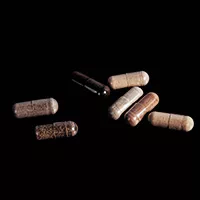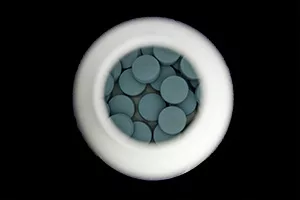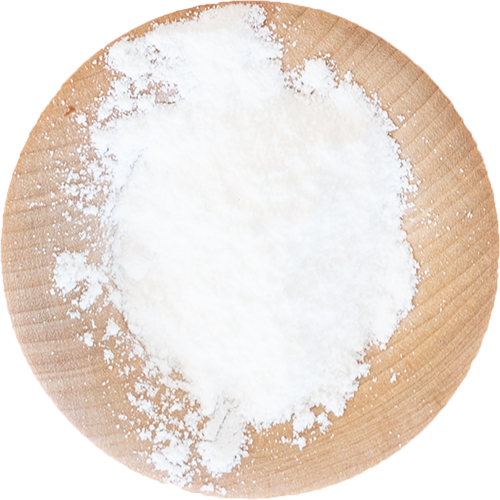Manganese Bisglycinate
Fully-Reacted Chelated Mineral
Manganese bisglycinate is a highly absorbable form of the mineral manganese, making it an ideal supplement ingredient. ‡
Manganese bisglycinate and manganese glycinate refer to the same mineral. Manganese bisglycinate is the chemical or scientific name of this form of manganese. ‡
Cypress Systems manganese bisglycinate is a fully chelated mineral, increasing its bioavailability in the body. Fully reacted, chelated minerals remain covalently bonded and can be properly absorbed and used by the body. Additionally they do not disassociate in the stomach’s acidic environment. ‡
Fully reacted mineral ingredients, such as our manganese bisglycinate are up to four times more bioavailable, with less inhibition by other minerals, and have fewer potential side effects. ‡
What is Manganese Bisglycinate?
Manganese bisglycinate is a fully reacted, chelated mineral created by binding bivalent manganese with two glycine molecules. The ratio of manganese to the amino acid glycine increases solubility, encouraging enhanced absorption in the small intestine and bloodstream. ‡
Manganese bisglycinate does not disassociate in the stomach’s acidic environment. Instead, this form of manganese remains covalently bonded and properly absorbed and used by the body. ‡
Manganese Bisglycinate Research Data
Research on manganese bisglycinate and manganese highlights a range of potential positive health outcomes: 2, 3, 4, 5, 6, ‡
The potential benefits manganese may have in supporting bone health and managing bone loss are widely studied. There is some evidence for supplementing with manganese, calcium, zinc, and copper to potentially minimize spinal bone loss due to the normal aging process for elderly postmenopausal women. ‡
Manganese has a recognized role in the development and function of the SOD antioxidant, leading researchers to investigate the potential health benifits manganese may have. ‡
When combined with other supplements, manganese may support a reduction in inflammation, primarily due to the activity of SOD.
Because manganese has a primary role in insulin production and is mostly located in the pancreas, researchers have investigated the role this mineral has in glucose regulation and activity.
Recommended Daily Allowance of Manganese
Males aged 19+ : 2.3 mg
Females aged 19+: 1.8 mg
Females aged 19 – 50 who are pregnant: 2.0 mg
Females aged 19 – 50 who are breast feeding: 2.6 mg
Applications for Manganese Bisglycinate

Supplement
Capsules

Nutritional
Gummies

Nutritional
Tablets

Functional
Foods &
Beverage
Benefits of Manganese Bisglycinate
The benefits of manganese bisglycinate and manganese may include: 1, 2, 7, ‡
Enabling the healthy formation of bones, connective tissues, and cartilage. ‡
Supporting glucose, lipid, and carbohydrate metabolism. ‡
Protecting against oxidative stress caused by free radicals. ‡
Providing immune system support. ‡
Request Product Information
‡These statements have not been evaluated by the Food and Drug Administration. These products are not intended to diagnose, treat, cure or prevent any disease.
1 Manganese: Mount Sinai (Accessed July 14, 2023) https://www.mountsinai.org/health-library/supplement/manganese
2 Manganese: Fact Sheet for Health Professionals (Accessed July 14, 2023) https://ods.od.nih.gov/factsheets/Manganese-HealthProfessional/
3 Strause L, Saltman P, Smith KT, Bracker M, Andon MB. Spinal bone loss in postmenopausal women supplemented with calcium and trace minerals. J Nutr. 1994 Jul;124(7):1060-4. doi: 10.1093/jn/124.7.1060. PMID: 8027856. (Accessed July 14, 2023) https://pubmed.ncbi.nlm.nih.gov/8027856/
4 Robbins D, Zhao Y. Antioxid Redox Signal. 2014 Apr 1;20(10):1628-45. doi: 10.1089/ars.2013.5297. Epub 2013 Jul 18. PMID: 23706068; PMCID: PMC3942707. (Accessed July 14, 2023) https://www.ncbi.nlm.nih.gov/pmc/articles/PMC3942707/
5 Das A Jr, Hammad TA. Sep;8(5):343-50. doi: 10.1053/joca.1999.0308. PMID: 10966840. (Accessed July 14, 2023) https://pubmed.ncbi.nlm.nih.gov/10966840/
6 Koh ES, Kim SJ, Yoon HE, Chung JH, Chung S, Park CW, Chang YS, Shin SJ. BMC Endocr Disord. 2014 Mar 8;14:24. doi: 10.1186/1472-6823-14-24. PMID: 24606630; PMCID: PMC3973834. (Accessed July 14, 2023) https://www.ncbi.nlm.nih.gov/pmc/articles/PMC3973834/
7 10 Evidence-Based Benefits of Manganese: Healthline.com (Accessed July 14, 2023) https://www.healthline.com/nutrition/manganese-benefits
